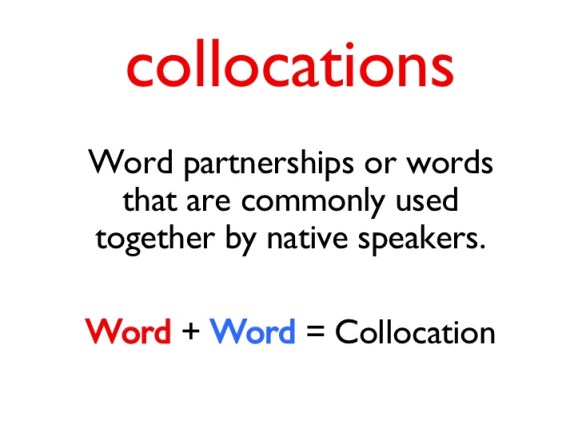
What is a collocation?
Why we have to learn collocations?You need to learn collocations because they will help you to speak and write English in a more natural and accurate way. People will probably understand what you mean if you talk about making a crime or say there was very hard rain this morning, but your language will sound unnatural and might perhaps confuse. Did you mean that there was a lot of rain or perhaps that there was a hailstorm? Learning collocations will also help you to increase your range of English vocabulary. For example, you’ll find it easier to avoid words like very or nice or beautiful or get by choosing a word that fits the context better and has a more precise meaning. This is particularly useful if you are taking a written exam in English and want to make a good impression on the examiners. In advanced level exams, marks are often specifically awarded for the appropriate handling of collocation. |
How to learn collocations
- Be aware of collocations, and try to recognize them when you see or hear them.
- Treat collocations as single blocks of language. Think of them as individual blocks or chunks, and learn strongly support, not strongly + support.
- When you learn a new word, write down other words that collocate with it (remember rightly, remember distinctly, remember vaguely, remember vividly).
- Read as much as possible. Reading is an excellent way to learn vocabulary and collocations in context and naturally.
- Revise what you learn regularly. Practise using new collocations in context as soon as possible after learning them.
- Learn collocations in groups that work for you. You could learn them by topic (time, number, weather, money, family) or by a particular word(take action, take a chance, take an exam).
- You can find information on collocations in any good learner's dictionary. And you can also find specialized dictionaries of collocations.
Tell me who you go with and I'll tell you who you areSaying
Types of collocation
There are several different types of collocation made from combinations of verb, noun, adjective etc. Some of the most common types are:
- adverb + adjective: completely satisfied (NOT
downrightsatisfied) - adjective + noun: excruciating pain (NOT excruciating
joy) - noun + noun: a surge of anger (NOT a
rushof anger) - noun + verb: lions roar (NOT lions
shout) - verb + noun: commit suicide (NOT
undertakesuicide) - verb + expression with preposition: burst into tears (NOT
blow up intears) - verb + adverb: wave frantically (NOT wave
feverishly)
Sample Collocations
There are several different types of collocation. Collocations can be adjective + adverb, noun + noun, verb + noun and so on. Below you can see seven main types of collocation in sample sentences.
1. adverb + adjective
- Invading that country was an utterly stupid thing to do.
- We entered a richly decorated room.
- Are you fully aware of the implications of your action?
2. adjective + noun
- The doctor ordered him to take regular exercise.
- The Titanic sank on its maiden voyage.
- He was writhing on the ground in excruciating pain.
3. noun + noun
- Let's give Mr Jones a round of applause.
- The ceasefire agreement came into effect at 11am.
- I'd like to buy two bars of soap please.
4. noun + verb
- The lion started to roar when it heard the dog barking.
- Snow was falling as our plane took off.
- The bomb went off when he started the car engine.
5. verb + noun
- The prisoner was hanged for committing murder.
- I always try to do my homework in the morning, after making my bed.
- He has been asked to give a presentation about his work.
6. verb + expression with preposition
- We had to return home because we had run out of money.
- At first her eyes filled with horror, and then she burst into tears.
- Their behaviour was enough to drive anybody to crime.
7. verb + adverb
- She placed her keys gently on the table and sat down.
- Mary whispered softly in John's ear.
- I vaguely remember that it was growing dark when we left.




